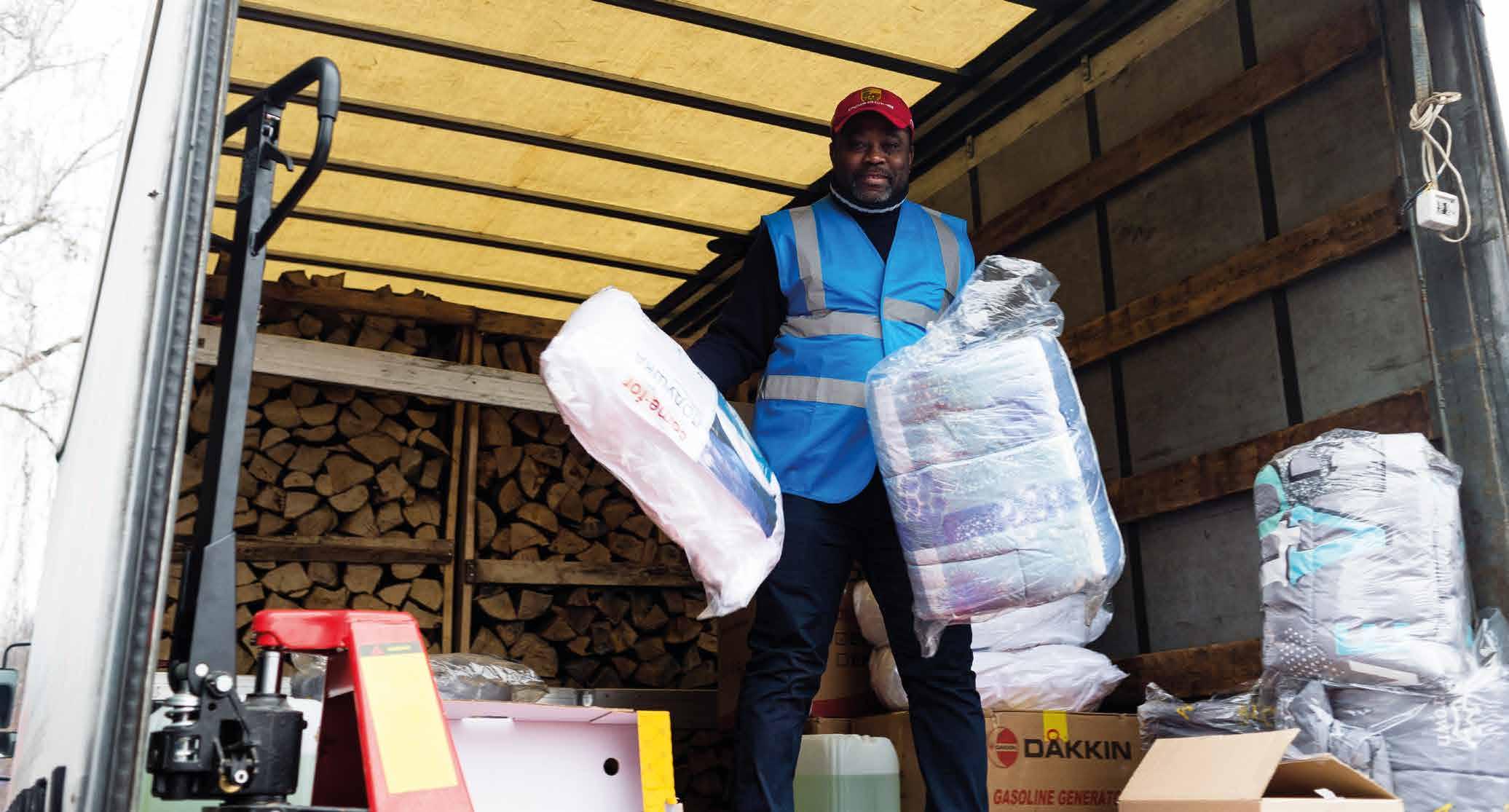
4 minute read
REGIONAL INITIATIVES
Thanks to the generosity of the UK public in supporting the Ukraine Humanitarian Appeal, the DEC has been able to fund a range of collaborative projects to promote improvements in humanitarian practice across Ukraine and the region. These projects aim to bring immediate benefits to people being supported by the Ukraine response, and long-term benefits in future humanitarian delivery.
Strengthening and transforming humanitarian response
Engine 2 is a transformational humanitarian response programme led by the Humanitarian Leadership Academy which aims to supplement the traditional approach to humanitarian responses (Engine 1) with additional initiatives that address systemic shortfalls in the humanitarian system (Engine 2). The programme focuses on strengthening local leadership and civil society organisations, supporting local solutions, and boosting technical expertise. As well as supporting a research institute for locally-led research and an analysis hub which designs and produces high quality analysis of the humanitarian crisis and response in Ukraine, Engine 2 produces free, tailored learning resources for humanitarian responders and volunteers. The programme has so far delivered 83 training sessions for 1,120 humanitarian staff, including three cycles of a Crisis Leadership Programme.
Communication with disaster-affected communities
As humanitarian needs continue to increase within Ukraine and the region, effective communication, community engagement and accountability (CCEA) is needed more than ever. It enables affected people to have the information they need to make critical decisions and to connect with organisations providing aid. It also enables responders to deliver more timely, more relevant, and more efficient aid.

The DEC has funded the Communication with Disaster Affected Communities Network (CDAC) to implement a project aiming to integrate local skills and experience in CCEA and ensure all humanitarian responders have access to the communication, information and engagement tools they need to enable crisisaffected people to remain safe and secure and make informed decisions. The project seeks to identify critical gaps in CCEA practice and address these through online resources, training courses and a mentoring programme. During the reporting period, the project held meetings with practitioners in Ukraine, Poland and Moldova, with further meetings planned in Romania and Hungary; training events for 75 participants; mentoring seminars; snapshot reports of the current state of CCEA and developed tools and technical guidance.
Supporting cash delivery and integration
The DEC is supporting the Collaborative Cash Delivery Network (CCD) to ensure that local humanitarian actors have the institutional and technical capacity and funding to effectively and efficiently respond to humanitarian needs in Ukraine, Poland and Romania through quality cash programming. Since the inception of the project in January 2023, CCD has been developing resources on data portability – where recipients of aid control their information and make informed decisions about how, when and with whom to share their personal data for humanitarian assistance; and user-journey mapping – where recipients of aid drive improvements to cash-based humanitarian programming and government-led social protection programmes based on their voices, feedback and experience.
Perceptions of aid
The Ground Truth Solutions project regularly collects and analyses the perceptions and priorities of affected people on the quality and effectiveness of the humanitarian response and shares these views with humanitarian organisations so that they can take them into account in programming. The project has conducted a phone survey of people in need and aid recipients in Ukraine, and held focus group interviews with people in need, aid recipients, and representatives of local organisations including youth, women’s, LGBTQIA+, Roma, and organisations of people with disabilities. A majority of people surveyed did not feel informed about the aid and services available to them; found it difficult to access aid; and did not know how to provide feedback or make a complaint. The project developed a range of recommendations to promote better awareness and engagement, especially amongst marginalised groups such as Roma, LGBTQIA+, older people and people with disabilities.
Strengthening local humanitarian action
A scoping exercise was commissioned by the DEC to gather ideas, options and approaches from local and national actors implementing humanitarian response activities in Ukraine on ways that the DEC can better support and strengthen local humanitarian action. Recommendations include establishing a new pooled fund providing more accessible funds for Ukrainian civil society organisations, from national NGOs to local volunteer and community groups; and supporting Ukrainian organisations to bring their voice into the formal humanitarian coordination system, which shares oversight and planning of the overall humanitarian response and tends to be dominated by UN and international agencies. Based on these recommendations, the DEC is working with member charities to consider how it can support the adoption of the most significant findings.
Regional safeguarding hub
Internally displaced people and refugees face many safeguarding and protection risks, such as sexual exploitation, abuse and harassment at border crossings and in places where they access services or find accommodation. The risks are particularly high for women, children, older people, and people with disabilities. To reduce this risk, the Safeguarding Resource and Support Hub for Eastern Europe has been providing support to organisations working in the Ukraine response to strengthen their safeguarding policies and practices. Since the launch of an online hub, which provides information in Ukrainian, Polish, Romanian, Russian and in English, over 12,000 users have accessed safeguarding resources. During the reporting period, the hub has released online learning modules in five languages; launched a helpdesk to provide free safeguarding advice; developed a Safeguarding Essentials training package for civil society staff which was piloted through three face-to-face training sessions with local organisations in Poland; and held a webinar highlighting the safeguarding risks for refugees with disabilities.
Making humanitarian standards accessible
The Sphere Handbook is one of the oldest and most widely recognised sets of humanitarian principles and standards. The DEC funded the Sphere Project to translate the handbook into Ukrainian, Polish, Romanian and Slovak to support people working in the Ukraine response – languages proposed by DEC member charities. Online and in-person workshops have taken place in eastern Europe, including local and national organisations which are new to participating in a large-scale humanitarian response. One common feedback received from participants in the workshops was:










